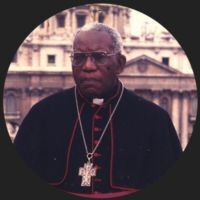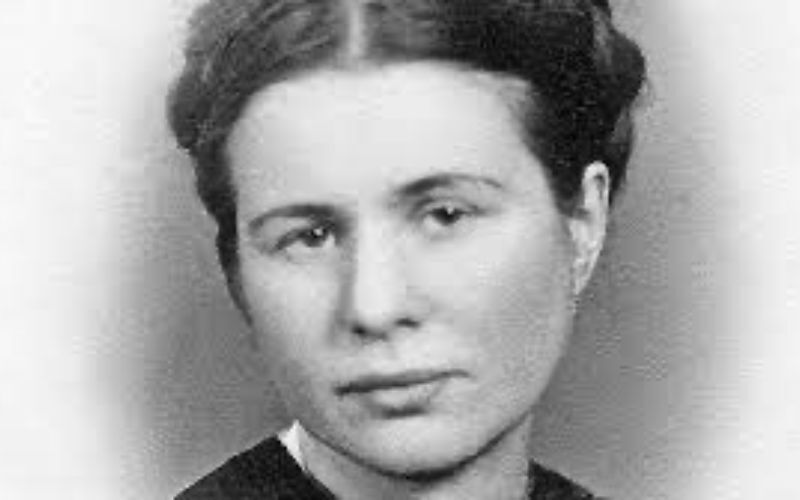Christophe Munzihirwa

There are things that can be seen only with eyes that have cried.
As Rwandan troops poured into the eastern part of what was then Zaire in the fall of 1996, Archbishop Christophe Munzihirwa issued a final, fervent plea for help.
"We hope that God will not abandon us and that from some part of the world will rise for us a small flare of hope," he said in his Oct. 28 message, broadcast to anyone, anywhere, who might have been listening. As it turned out, no one was.
The civil and military leaders of the region, representing the last shreds of the crumbling autocratic regime of Mobutu Sese Seko, had fled weeks before, knowing that Mobutu was doomed and the Rwandans were unstoppable. Those Rwandans were largely members of the country's Tutsi minority who blamed Mobutu for harboring Hutu militants, and as their armed bands moved east they were killing anyone who got in their way.
Munzihirwa, bishop of the diocese of Bukavu in eastern Zaire since 1993, was thus all that stood between hundreds of thousands of Hutu refugees and potential annihilation. He had long criticized all parties to the region's violence. His last hope, shared with the handful of missionaries and diocesan personnel who stayed behind with him to shelter the refugees, was for rapid intervention by the international community.
It was not to be. Less than 24 hours later, in the afternoon of Oct. 29, death came for the archbishop.
Munzihirwa, a Jesuit who called himself a "sentinel of the people," was shot and killed by a group of Rwandan soldiers, his body left to decay in the deserted streets of the city of Bukavu. (It was more than 24 hours before a small group of Saverian seminarians was able to recover the body and prepare it for burial). Munzihirwa had surrendered himself in the hope that two companions might be able to get away in his car; they, too, however, had been caught and executed.
At his Nov. 29 funeral, someone recalled Munzihirwa's favorite saying: "There are things that can be seen only with eyes that have cried."
`So many of them'
The death of Christophe Munzihirwa, as harrowing as the details are, forms but a single episode in one of the most sweeping Christian dramas of the century just ended: the resurgence of martyrdom on a vast scale.
On May 7, 2000, as part of his celebration of the Great Jubilee, Pope John Paul II led a service of remembrance at the Roman Coliseum for what he called these "new Christian martyrs" -- Catholics and members of other Christian denominations.
"There are so many of them!" the pope exclaimed. "They are men and women of every land. They are people of all ages and callings." John Paul called them "countless unknown soldiers who fought for the great cause of the gospel."
A commission created by the pope had identified some 13,000 Christians who, in some sense, had sacrificed their lives in the 20th century for the faith. Most came from Europe -- some 8,700, almost all victims of communist regimes.
In recent years, however, a Vatican commission said, the primary killing fields for Christians have shifted to the Third World, and in the 1990s, to Africa.
Africa was, in many ways, the success story of the 20th century for the Catholic church, at least as measured by statistics. The number Of Catholics grew from 2 million to 116 million, representing 15.6 percent of the total population. Thirty-seven percent of all baptisms in Africa today are of adults, considered a reliable measure of evangelization success since it indicates a change in religious affiliation. The worldwide average, by way of contrast, is 13.2.
Yet this growth has come at a price. Western missionaries find themselves in danger as shifting waves African conflicts lap up against their schools, clinics and convents. Native Catholics, without the same degree of backing from global religious communities and Western governments, are even more vulnerable to instability.
In Munzihirwa's region of Central Africa, for example, at least 1.8 million people (some estimates run as high as four million) have died since 1996 in what is really the continent's first major continental war, involving the armies of eight nations and an ever-shifting constellation of rebel groups. Other conflicts in the Sudan, in Algeria, in Angola, in Sierra Leone -- in a bewildering series of trouble spots scattered across the continent -- continue to claim hundreds of thousands of lives.
Inevitably, killing on such a vast scale creates martyrs, people of faith who lose their lives because they refuse to turn away from danger.
Catholics who know Africa caution that much of this new martyrdom would not pass the most rigorous traditional tests of what being a "martyr" signifies. The faithful are not being asked to sacrifice to idols, or sign off on a king's illicit divorce. More often they are just in the wrong place at the wrong time.
"I was once confronted by a guy in Liberia who wanted to steal our car," said African Missions Fr. Kiernan O'Reilly. "I could have been stubborn and gotten myself killed. I suppose the folks back home in Ireland would have said, `How wonderful! He died for the faith,' but the troth is I would have been dead because I didn't want to give up the keys. This guy couldn't have cared less if I was an Anglican priest or a Buddhist monk or whatever."
Pressed on the point, however, O'Reilly acknowledged that his choice to be in a place where such confrontations are the stuff of daily life -- and similar choices by missionaries and native religious, priests, sisters and laity in Africa -- was itself a matter of faith.
"Presence is the key point," he said. "It's a gospel principle."
Most observers who know African Catholicism stress that it is not a forlorn, suffering church. Time and again people interviewed for this report underscored the vitality, the joy, they find in African Catholics, in African culture generally. Some worried that a focus on martyrs might distort impressions of a church bursting with new life.
Yet in modern Africa, life and death usually stand side by side, the latter often giving purpose and urgency to the former. The martyrs are thus very much part of the story of the living African church.
Symbol of hope
Like the better-known Oscar Romero of El Salvador, also slain by military assassins, Archbishop Christophe Munzihirwa has become a symbol of hope and resistance in his country, now called the Democratic Republic of Congo.
Born in Lukambo, in the Bukavu diocese, in 1926, Munzihirwa was ordained a priest in 1958 and joined the Jesuits in 1963. He studied social science and economics in Belgium, but returned to his country in 1969 to become the formation director for Jesuits in the Kinshasha province.
His prophetic streak surfaced in 1971, when the government of CIA-backed dictator Mobutu Sese Seko responded to a youth protest movement by forcibly enrolling university-age persons, including seminarians, in the military for two years. Munzihirwa insisted on being enlisted alongside his novices, much to the embarrassment of the regime.
Munzihirwa became the Jesuit provincial superior for Central Africa in 1980. In 1986 he was made a coadjutor bishop in Kasongo, and in 1993 he became archbishop of Bukavu.
Munzihirwa earned fame for his refusal to accept patronage from Mobutu. That occasionally created obstacles for him, as in 1995 when a Catholic missionary and members of an international solidarity movement were arrested in Kasongo. When Munzihirwa demanded their release, military officials taunted him for not being a "friend" of Mobutu.
Munzihirwa solved the problem by saying that until the group was let go, he would sleep outside their cell. They were freed that evening.
Like Romero, Munzihirwa was unafraid to denounce what he considered military misconduct. During a mid-1990s Mass to install a new bishop in Kasongo, in a time in which Mobutu had ordered the city sacked because he believed it was harboring dissenters, Munzihirwa said: "Here before me I see these soldiers. I see the colonel. Stop troubling the people! I ask you, I order you: Stop it!"
The commander wanted Munzihirwa taken into custody, and he replied: "I am ready. Arrest me." Other bishops present, however, intervened and prevented the arrest.
Despite that gesture of solidarity, Munzihirwa's criticisms of Mobutu at times left him isolated within Zaire's bishops' conference. In 1995, a missionary asked him why the bishops were not more outspoken, and he replied: "Father, you can't imagine. We are just a short distance removed from being part of the presidential mouvance," a French term meaning "inner circle."
After the genocide began in Rwanda in 1994, Munzihirwa became an outspoken protector of the Hum refugees who flooded his diocese. He recognized that a few had committed atrocities against Tutsis, but regarded most as innocent victims. He called for healing across ethnic boundaries.
"In these days, when we continue to dig common graves, where misery and sickness appear along thousands of kilometers, on routes, along pathways and in fields ... we are particularly challenged by the cry of Christ on the Cross: `Father, forgive them,'" Munzihirwa said in an August 1994 homily.
"God's mercy, which breaks the chain of vengeance, is hurtful to militants on every side. But in reality, that is the only thing that can definitively shatter the infernal circle of vengeance."
His martyrdom was not unexpected, at least not to him. Munzihirwa had written in an Easter meditation: "Despite anguish and suffering, the Christian who is persecuted for the cause of justice finds spiritual peace in total and profound assent to God, in accord with a vocation that can lead even to death."
His impact can be summed up in the words of Saverian Fr. Francesco Zampese, an Italian missionary who worked closely with Munzihirwa. Zampese told National Catholic Reporter: "He was the voice of his people."
Source: John L Allen, Jr., National Catholic Reporter, February 23, 2001

